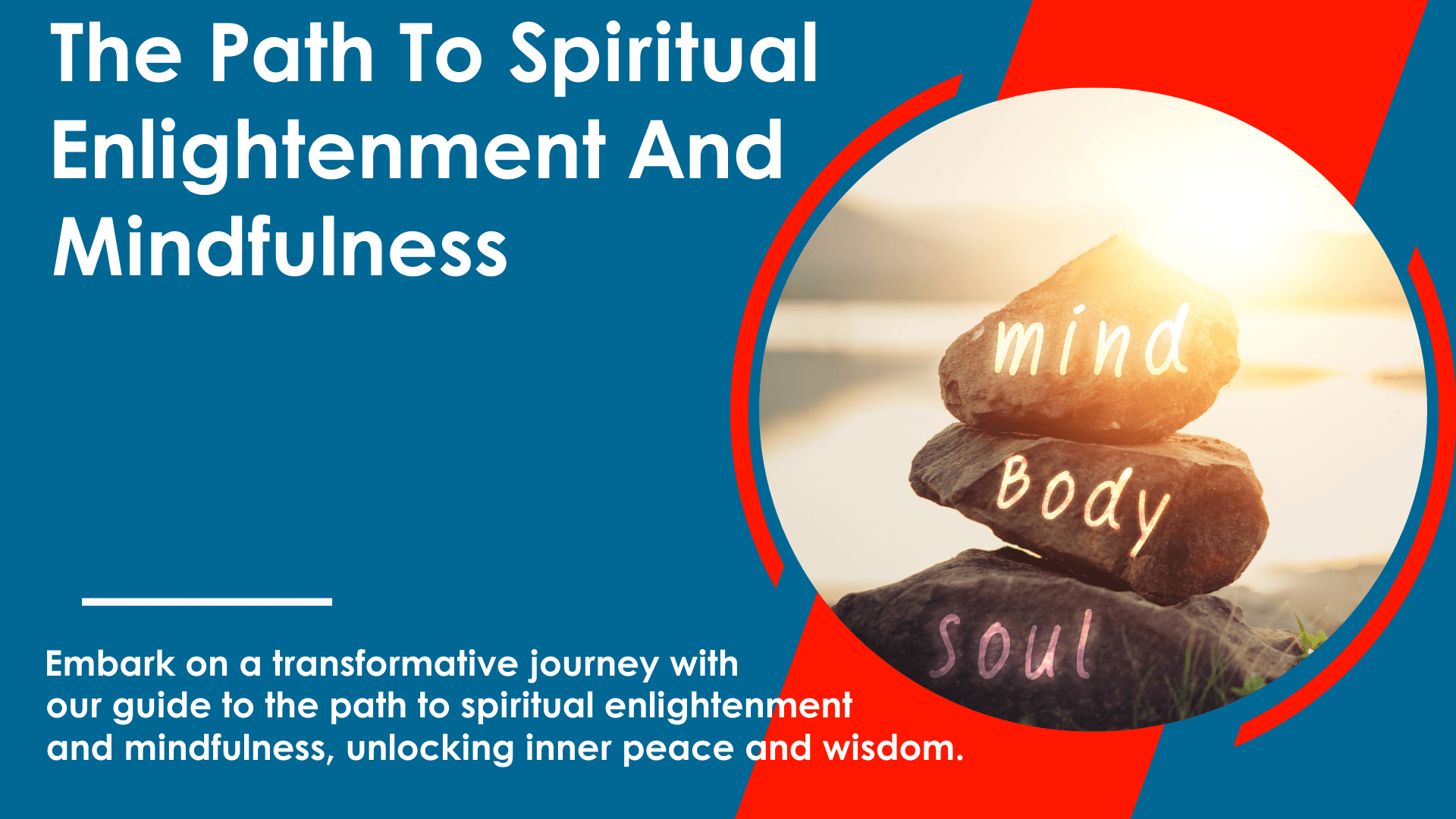The Path To Spiritual Enlightenment And Mindfulness
The path to spiritual enlightenment, the beauty of life, and mindfulness is a transformative journey that allows individuals to explore their inner selves, cultivate self-awareness, and unlock their true potential. It involves the practice of mindfulness, self-reflection, and the pursuit of inner peace. It is a journey toward spiritual awakening and the transformative power of mindfulness, clarity of mind, and wisdom.
By embarking on this path, individuals can experience personal growth, discover their purpose, and achieve a deeper understanding of themselves and the world around them.
Key Takeaways:
- Spiritual enlightenment and mindfulness involve a transformative journey of self-exploration and self-awareness.
- Practicing mindfulness and self-reflection are essential components of the spiritual journey.
- Spiritual guidance and mentorship play a crucial role in the path to enlightenment.
- Rituals and practices, such as meditation and prayer, aid in deepening one’s spiritual connection.
- The spiritual journey leads to personal growth, inner peace, and a deeper understanding of oneself and others.
Understanding the Essence of a Spiritual Journey

A spiritual journey is a deeply personal and introspective experience that involves seeking a connection to something greater than oneself. It is a quest for inner peace, self-discovery, and spiritual growth through the clarity of mind.
During this journey, individuals explore their beliefs, values, and purpose in life and seek to align themselves with their true selves. It is a transformative process that invites individuals to develop a deeper understanding of themselves and their place in the world.
Navigating the Path to Enlightenment
Embarking on a spiritual journey is a transformative experience that requires inner work, spiritual guidance, rituals, and practices and leads to profound personal growth and inner peace.
The Inner Work: Cultivating Mindfulness and Self-Reflection
Cultivating mindfulness and self-reflection are vital aspects of the spiritual journey. By developing an awareness of our thoughts, emotions, and behaviors, we can observe them without judgment and approach them with compassion. Mindfulness and self-reflection allow us to deepen our understanding of ourselves and the world around us, fostering personal growth and self-discovery.
The Role of Spiritual Guidance and Mentorship
Spiritual guidance and mentorship play a crucial role in navigating the path to enlightenment. Seeking wisdom and support from experienced practitioners or spiritual teachers helps us gain insights and advice, offering valuable perspectives and suggestions.
Spiritual mentors provide encouragement, knowledge, and assistance on our transformative journey, helping us overcome challenges and obstacles along the way.
The Power of Rituals and Practices
Rituals and practices such as meditation, prayer, or yoga are powerful tools for connecting with the divine and cultivating spirituality. Engaging in these practices allows us to deepen our connection with ourselves, transcend our limiting beliefs, and experience a sense of inner peace, harmony, and clarity of mind. Rituals and practices provide a structured framework for spiritual exploration and growth, drawing upon the beauty of life’s ancient wisdom.
The Transformative Nature of the Journey
The spiritual journey is a transformative process that challenges us to question our beliefs, expand our perspectives, and evolve as individuals. It invites us to step out of our comfort zones, confront our fears, and embark on a journey of self-discovery. Through this transformative journey, we gain profound insights, develop resilience, and experience profound shifts in our consciousness and worldview.
Finding Inner Peace Through Spiritual Enlightenment
The ultimate goal of the spiritual journey is to find inner peace by attaining spiritual enlightenment. By aligning ourselves with our true selves, connecting with the divine, and letting go of attachments and limiting beliefs, we can experience a deep sense of peace, purpose, and fulfillment. Spiritual enlightenment allows us to transcend the noise of the external world and find tranquility within ourselves.
| Cultivating Mindfulness and Self-Reflection | Spiritual Guidance and Mentorship |
| Develop an awareness of thoughts, emotions, and behaviors. | Seek wisdom and guidance from experienced practitioners or teachers. |
| Approach thoughts and emotions with compassion | Overcome challenges and obstacles on the spiritual journey. |
| Deepen understanding of oneself and the world. | Receive encouragement, knowledge, and support. |
Finding Inner Peace through Meditation

Meditation is a powerful practice for finding inner peace on the spiritual journey. It involves quieting the mind, focusing on the present moment, and cultivating a sense of calm and stillness. Through various journeys toward enlightenment activities and meditation techniques, individuals can learn to let go of negative thoughts, reduce stress and anxiety, and cultivate a deep sense of inner peace and tranquility.
The practice of meditation allows individuals to connect with their inner selves and create a peaceful space within. By dedicating time and effort to meditation, individuals can experience the following benefits:
- Increased self-awareness and mindfulness
- Reduced stress and anxiety
- Improved concentration and focus
- Enhanced emotional well-being
- Improved overall mental and physical health
There are various meditation techniques that individuals can explore to find inner peace. Some standard techniques include:
- Mindfulness meditation: This technique involves focusing on the present moment and observing thoughts and sensations without judgment.
- Guided meditation: In guided meditation, individuals listen to recorded instructions that help them relax, visualize, and cultivate inner peace.
- Transcendental meditation: Transcendental meditation, rooted in Hinduism, involves the use of a specific mantra or sound to promote deep relaxation and transcendental experiences.
- Loving-kindness meditation: This technique involves generating feelings of compassion, kindness, and love towards oneself and others.
- Body scan meditation: In body scan meditation, individuals focus their attention on different parts of the body, promoting relaxation and bodily awareness.
It’s essential to find a meditation technique that resonates with you and suits your individual needs and preferences. With regular practice and persistence, meditation can become a powerful tool for finding inner peace and cultivating a deep sense of spiritual well-being.
Embracing the Process of Self-Discovery
Self-discovery is a vital aspect of the spiritual journey. It involves delving into one’s inner self, uncovering personal beliefs and values, and gaining a deeper understanding of one’s strengths, weaknesses, and passions. Through self-discovery, individuals embark on a transformative process of personal growth, develop a stronger sense of self, and align their actions with their true values and purpose.
As individuals explore their inner selves, they open doors to new possibilities and potential. Through self-reflection and introspection, they gain insight into their desires, motivations, and aspirations. This newfound self-awareness serves as a foundation for personal growth and guides individuals toward fulfilling their true potential.
Self-discovery is not a linear process but a continuous journey of self-exploration and self-acceptance. It involves embracing both the light and shadow aspects of oneself, acknowledging and learning from past experiences, and embracing personal growth as a lifelong pursuit. Each step taken on the path of self-discovery contributes to a deeper understanding of oneself and fosters personal evolution.
Self-discovery also enables individuals to align their actions with their true values and purpose. By gaining clarity on what matters most to them, individuals can make choices and decisions that are authentic and in line with their inner selves. This alignment brings a sense of fulfillment, purpose, and joy.
Embracing the process of self-discovery is a powerful catalyst for personal growth and transformation. By exploring one’s inner world, individuals can unlock their true potential, find fulfillment, and embark on a journey of self-actualization. It is a lifelong pursuit that offers profound insights, deep connections, and a greater sense of purpose and meaning in life.
The Role of Spirituality in Daily Life

Spirituality plays a significant role in daily life, as it provides individuals with a framework for living with purpose, mindfulness, and gratitude. By incorporating spirituality into daily routines, individuals can cultivate mindfulness, deepen their connection with themselves and others, and navigate life’s challenges with resilience and inner peace.
Practicing spirituality in daily life involves integrating mindfulness practices incorporating Buddhism and Hinduism into various aspects of one’s day. This can be done through simple activities such as:
- Meditating or engaging in conscious breathing exercises to center oneself and enhance presence.
- Engaging in reflective journaling to explore personal thoughts, emotions, and experiences.
- Expressing gratitude for the blessings and moments of joy in life.
- Setting intentions for the day, aligning actions with values and purpose.
- Engaging in acts of kindness and compassion towards oneself and others.
By incorporating these practices into daily life, individuals can create a sacred space for self-reflection, self-care, and spiritual connection. Such practices allow individuals to cultivate a deeper understanding of themselves, their relationships, and their place in the world, fostering a sense of wholeness and well-being.
– Sadhguru
“Spirituality is not just about going to a sacred place once a week; it is about bringing sacredness into every aspect of life.”
Living a spiritual life also involves nurturing a sense of compassion and interconnectedness with others. This can be achieved through acts of kindness, active listening, and cultivating empathy. By recognizing the shared humanity in others, individuals can foster deeper connections and contribute to a more harmonious and compassionate world.
Spirituality offers a profound framework for living a more meaningful and fulfilling life. By integrating spiritual practices into daily routines, individuals can cultivate mindfulness, deepen their sense of purpose, and navigate life’s challenges with resilience and inner peace.
| Benefits of Incorporating Spirituality in Daily Life | Ways to Cultivate Spirituality in Daily Life |
| Enhanced self-awareness and self-compassionImproved overall well-being and mental healthGreater sense of purpose and fulfillmentStronger personal relationshipsDecreased stress and anxiety levels | Engage in meditation or mindfulness practices.Express gratitude dailyPractice acts of kindness and compassionSet meaningful intentions for the dayConnect with nature regularly |
Overcoming Challenges and Obstacles on the Path
The spiritual journey is a transformative experience that can be filled with challenges and obstacles. It requires individuals to confront their fears, doubts, and limiting beliefs. These hurdles can test one’s commitment and determination to continue on the path toward spiritual growth and enlightenment. However, with the right mindset and strategies, these challenges can be overcome.
Developing resilience is crucial in overcoming obstacles on the spiritual journey. Resilience helps individuals bounce back from setbacks and maintain their focus and motivation. It involves cultivating a positive mindset, embracing setbacks as learning opportunities, and seeking support when needed.
Cultivating self-compassion is another essential aspect of navigating challenges on the spiritual journey. Self-compassion involves treating oneself with kindness, understanding, and care. It allows individuals to acknowledge their struggles without judgment and to offer themselves support and encouragement.
Seeking support from mentors or like-minded individuals can also be beneficial in the journey of spiritual growth. They are overcoming challenges. Mentors provide guidance, wisdom, and perspective from their own experiences, inspiring individuals to stay committed to their spiritual journey.
Connecting with like-minded individuals creates a sense of community and support, allowing individuals to share their challenges, gain insights, and find encouragement.
By acknowledging and embracing the challenges and obstacles encountered on the spiritual journey, individuals can develop the resilience, self-compassion, and support network necessary to overcome them. These challenges are part of the transformative process and can lead to profound personal growth, self-discovery, and spiritual enlightenment.
Seeking Spiritual Guidance and Mentorship

Embarking on a spiritual journey can be a transformative experience that leads to personal growth and self-discovery. Along this path, the guidance and mentorship of a spiritual mentor can play a vital role in providing support, wisdom, and advice.
A spiritual mentor is someone who has walked the path before and can offer valuable insights and perspectives. By seeking the transformative power of ancient wisdom, spiritual guidance, and mentorship, individuals can accelerate their journey toward enlightenment and transformation.
Benefits of Spiritual Mentorship
Spiritual mentorship offers numerous benefits for those on a spiritual journey. Here are some of the advantages individuals can expect when seeking spiritual guidance:
- Learning from Experience: A spiritual mentor provides the opportunity to learn from someone who has already gone through the challenges and obstacles of the spiritual journey. Their experience can offer valuable insights and lessons.
- New Perspectives: A spiritual mentor can provide fresh perspectives and alternative ways of thinking that can expand an individual’s understanding and deepen their spiritual practice.
- Personalized Guidance and Feedback: A mentor can offer personalized guidance tailored to an individual’s unique needs and challenges, incorporating the transformative power of ancient wisdom. They can provide feedback and support to help navigate difficult moments or obstacles on the path.
- Accelerated Growth and Transformation: With the guidance of a mentor, individuals can expedite their personal growth and transformation. A mentor’s support and wisdom can help individuals overcome limitations and reach new levels of spiritual awareness.
Overall, spiritual mentorship provides a valuable source of support, guidance, and inspiration on the spiritual journey. It is a powerful tool for deepening one’s practice and accelerating personal growth.
The Role of Mentorship in Transformation
Mentorship plays a significant role in the process of transformation on the spiritual journey. Here are some key aspects of mentorship in facilitating transformation:
- Accountability: A mentor helps hold individuals accountable for their spiritual practice and growth. They provide encouragement and support, ensuring individuals stay committed to their journey.
- Challenging Limiting Beliefs: A mentor can challenge an individual’s limiting beliefs and help them break free from them. By questioning assumptions and offering alternative perspectives, a mentor can broaden an individual’s understanding and open up new possibilities.
- Providing Tools and Techniques: A mentor can share various tools, techniques, and practices that individuals can incorporate into their spiritual journey. These tools can help individuals deepen their practice and overcome obstacles.
- Creating a Safe Space: A mentor creates a safe and supportive space for individuals to explore their spirituality. This space allows for vulnerability, trust, and the freedom to express oneself without judgment, fostering a transformative journey toward spiritual enlightenment.
By serving as a guide, a mentor can facilitate transformation by providing individuals with the necessary tools, resources, and support to successfully navigate their spiritual journey.
| Benefits of Spiritual Mentorship | The Role of Mentorship in Transformation |
| Learning from Experience | Accountability |
| New Perspectives | Challenging Limiting Beliefs |
| Personalized Guidance and Feedback | Providing Tools and Techniques |
| Accelerated Growth and Transformation | Creating a Safe Space |
Embracing a Spiritual Awakening

A spiritual awakening is a profound shift in consciousness and perception that can occur during the spiritual journey. It involves a deep understanding of one’s true nature and connection to the divine. Embracing a spiritual awakening allows individuals to experience a greater sense of purpose, interconnectedness, and inner peace.
Sustaining the Spiritual Journey
In order to sustain the spiritual journey, consistent effort and dedication are required. It is a continuous process that necessitates ongoing practice and growth. Here are some key strategies to help individuals maintain their spiritual journey:
Practice Mindfulness Regularly
Mindfulness plays a crucial role in spiritual growth and sustaining the spiritual journey. By practicing mindfulness regularly, individuals can cultivate a state of present-moment awareness and develop a deeper connection with themselves and the world around them. Mindful practices such as meditation, deep breathing exercises, or mindful walking can help individuals stay grounded and focused on their spiritual path.
Set Achievable Goals
Setting achievable goals is essential for maintaining motivation and progress on the spiritual journey. By breaking down long-term aspirations into smaller, manageable steps, individuals can stay focused and celebrate their progress along the way. Each milestone achieved brings a sense of fulfillment and encourages individuals to continue their spiritual growth.
Stay Curious and Open-Minded
Remaining curious and open-minded is critical to expanding spiritual horizons. Embracing new ideas, exploring different perspectives, and seeking out diverse spiritual practices can provide valuable insights and deepen understanding. By staying open to new possibilities, individuals can continue to evolve and grow on their spiritual journey.
Connect with Like-Minded Individuals
Building a supportive community of like-minded individuals is essential for sustaining the spiritual journey. Surrounding oneself with individuals who share similar spiritual values and interests provides an invaluable source of inspiration, guidance, and encouragement. Through shared experiences and discussions, individuals can learn from one another and foster a sense of belonging.
Celebrate Small Victories
It’s important to celebrate and acknowledge the small victories and milestones achieved on the spiritual journey. Whether it’s overcoming a personal challenge, deepening self-awareness, or experiencing moments of profound insight, recognizing and celebrating progress helps to maintain motivation and positive momentum. Each step forward brings individuals closer to their spiritual goals.
Conclusion: Step-By-Step To Embark On The Path To Spiritual Enlightenment and Mindfulness
The path to spiritual enlightenment and mindfulness is a transformative journey that offers individuals the opportunity to explore their inner selves, cultivate self-awareness, and unlock their true potential.
Through practices such as mindfulness, self-reflection, and seeking spiritual guidance, individuals can experience personal growth, find inner peace, and develop a deeper understanding of themselves and the world around them. By embracing the process of self-discovery and overcoming challenges along the way, individuals can embark on a fulfilling journey toward spiritual awakening and transformation.
FAQs: The Path to Spiritual Enlightenment and Mindfulness

Q: What is a spiritual journey?
A spiritual journey is a transformative quest for self-discovery and enlightenment. It involves exploring one’s inner self, connecting with something greater than oneself, and cultivating mindfulness and self-awareness. The path to spiritual enlightenment allows individuals to discover their true purpose, find inner peace, and deepen their understanding of themselves and the world around them.
Q: Why is self-discovery important in a spiritual journey?
Self-discovery is a vital aspect of the spiritual journey as it enables individuals to gain a deeper understanding of themselves, their beliefs, and their passions.
Through self-reflection, individuals can identify limiting beliefs, overcome challenges, and align their actions with their true values and purpose. Self-discovery is a continuous process that fosters personal growth and paves the way for spiritual awakening and transformation.
Q: How can meditation help in finding inner peace on a spiritual journey?
Meditation is a powerful tool that promotes inner peace and tranquility on the spiritual journey. By quieting the mind, focusing on the present moment, and cultivating mindfulness, individuals can let go of negative thoughts and emotions, reduce stress and anxiety, and connect with their inner selves. Through regular meditation practice, individuals can cultivate a deep sense of inner peace, clarity, and spiritual growth.
Q: What role does spirituality play in daily life?
Spirituality plays a significant role in daily life as it provides a framework for living with purpose, mindfulness, and gratitude. Integrating spirituality into daily routines allows individuals to cultivate mindfulness, deepen their connection with themselves and others, and navigate life’s challenges with resilience and inner peace.
It offers a sense of meaning and fulfillment, guiding individuals in aligning their actions with their spiritual values and principles.

Q: How can challenges and obstacles be overcome on a spiritual journey?
Challenges and obstacles are inherent in the spiritual journey, but they can be overcome with resilience and perseverance. By developing self-compassion, seeking support from mentors or like-minded individuals, and maintaining a growth mindset, individuals can navigate through challenges and use them as opportunities for personal growth and transformation.
Embracing the lessons and insights gained from overcoming obstacles brings individuals closer to their spiritual goals and aspirations.
Q: Why is seeking spiritual guidance and mentorship important?
Seeking spiritual guidance and mentorship is invaluable on the spiritual journey. A spiritual mentor can provide wisdom, support, and guidance based on their own experiences and insights.
They offer personalized advice, help individuals navigate their challenges, and provide encouragement along the way. Having a mentor allows for accelerated personal growth, expanded perspectives, and a deeper connection with one’s spiritual path.
Q: What is a spiritual awakening?
A spiritual awakening refers to a profound shift in consciousness and perception that often occurs during the spiritual journey. It is a transformative experience where individuals gain a deeper understanding of their true nature, purpose, and interconnectedness with the universe.
A spiritual awakening brings about a heightened sense of awareness, inner peace, and a greater alignment with one’s authentic self.
Q: How can the spiritual journey be sustained over the long term?
To sustain the spiritual journey over the long term, it is essential to cultivate mindfulness regularly, set achievable goals, stay curious and open-minded, connect with like-minded individuals, and celebrate small victories along the way.
By incorporating these practices into daily life and maintaining a dedicated mindset, individuals can stay committed to their spiritual growth, navigate challenges, and experience a continuous sense of fulfillment and enlightenment.
Source Links








